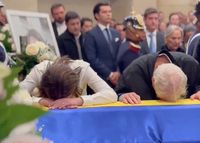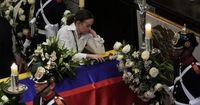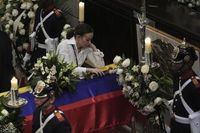Colombia is once again in mourning, its political landscape shaken by the assassination and subsequent death of Senator and presidential candidate Miguel Uribe Turbay. The 39-year-old opposition leader, widely regarded as a rising star and a favorite for the 2026 presidential race, succumbed to his wounds early on August 11, 2025, after a harrowing two months in intensive care following a brazen attack during a public rally in Bogotá.
Uribe Turbay’s death, confirmed by his wife María Claudia Tarazona in a heartfelt social media post—“Rest in peace, love of my life. I will take care of our children. I ask God to show me the way to learn to live without you”—has sparked a wave of national grief and global concern. As the Colombian flag flew at half-staff on public buildings across the country, the government declared August 12 a national day of mourning, with tributes and ceremonies unfolding in the capital’s most hallowed halls.
The assassination attempt took place on June 7, 2025, in Bogotá’s working-class Fontibón district. According to Colombia One and The City Paper Bogotá, a 14-year-old assailant shot Uribe Turbay three times, twice in the head. Despite the best efforts of doctors at Santa Fe Foundation Hospital, where he underwent multiple neurological procedures, his condition never stabilized. The attack’s brutality and the youth of the alleged perpetrator shocked the nation, drawing comparisons to the dark days of Pablo Escobar’s campaign of terror in the 1990s.
Authorities quickly arrested the teenage shooter at the scene and later detained several others, but as of this writing, the motive and the identity of those who ordered the killing remain unknown. The Colombian Attorney General has classified the case as a magnicidio—a term reserved for the murder of high-ranking political figures—placing Uribe Turbay’s name alongside those of Luis Carlos Galán and Rodrigo Lara Bonilla, both victims of political violence in the late 20th century.
In the immediate aftermath, condolences poured in from across Colombia’s political spectrum and beyond. President Gustavo Petro expressed his sorrow and called the killing “a defeat for Colombia and for life.” In a public statement, Petro emphasized, “Life stands above any ideology… In a progressive government that cherishes life, an attack with a tragic outcome against an opposition senator has occurred. Its causes, still under investigation, indicate for now a path very different from what was initially and prejudicially suggested. The investigation must be deepened. And it will be the competent authorities for it, aided by international experts, who will make their statement in due course.”
Petro further insisted that his administration would not pursue vengeance, stating, “We have not persecuted any member of the opposition, nor will we. For us, who have been persecuted and whose friends have been murdered, this is one of our priorities. Revenge is not Colombia’s path. We have endured decades of violence due to revenge. No more. That is why we are sad, we feel the pain of Miguel’s death, as if he were one of our own.”
Yet, Petro’s response has not been without controversy. While Bogotá Mayor Carlos Fernando Galán declared three days of official mourning in the capital, President Petro limited the national observance to a single day. Critics—both inside and outside the government—have pointed to this as evidence of a missed opportunity to unite the country in a moment of collective grief. The contrast in gestures has only added to the charged political atmosphere, with many Colombians yearning for a stronger, more unified message from their leaders.
The outpouring of grief extended far beyond Colombia’s borders. In the United States, Florida lawmakers María Elvira Salazar and Mario Díaz-Balart expressed their condolences, highlighting Uribe Turbay’s passion for democracy and his role as a beacon of hope. “His passing leaves an immense void in those who knew him and profoundly hurts the heart of all Colombia,” said Salazar. Díaz-Balart added, “I join the Colombian people in this moment of profound sadness for the passing of Miguel Uribe, a young politician who was a hope for democracy in his country. My deepest condolences to his family, and my conviction that violence must be eradicated from Colombia.”
In a striking display of solidarity, the United States dispatched a high-level bipartisan delegation to attend Uribe Turbay’s funeral. Deputy Secretary of State Christopher Landau, acting U.S. Ambassador John McNamara, DEA director Terrance Cole, and Senator Bernie Moreno of Ohio were among those scheduled to arrive in Bogotá for the funeral Mass, set for noon on August 13 at the city’s Catedral Primada. Landau, speaking to The City Paper Bogotá, remarked, “It is very concerning that conservative candidates in many countries, including our own, have been targeted for assassination attempts.” He stressed the importance of defending democracy and reaffirmed the “solid diplomatic relationship” between Washington and Bogotá.
Secretary of State Marco Rubio echoed these sentiments, stating, “The United States stands in solidarity with his family, the Colombian people, both in mourning and demanding justice for those responsible.” A second U.S. mission, led by Senator Rubén Gallego of Arizona, planned to arrive on August 14 to discuss related criminal cases and reinforce the message of support.
Inside Colombia, the Capitol opened its doors for three days of posthumous tributes. Uribe Turbay’s coffin lay in state in the Elliptical Hall, where family, friends, and political leaders gathered to honor his memory. The funeral Mass, officiated by Cardinal Luis José Rueda Aparicio, was expected to draw a cross-section of Colombia’s political elite, including presidential candidates from centrist and right-wing parties, as well as members of the international diplomatic corps. Notably, President Petro and his cabinet were not expected to attend, a decision that has drawn further scrutiny.
Amid the grief and political tension, Uribe Turbay’s widow, María Claudia Tarazona, made a poignant appeal for national unity and healing. Speaking outside the Capitol, she urged Colombians to pursue “love, unity, and peace,” and called for justice “swiftly but without vengeance.” Her words resonated deeply at a time when many fear that the assassination could reignite the cycle of political violence that has haunted Colombia for decades.
The pain of this loss is generational. Uribe Turbay’s mother, journalist Diana Turbay, was herself a victim of Colombia’s violent past—killed in 1991 during a botched rescue operation after being kidnapped by the Medellín Cartel’s “Extraditables.” The echoes of that tragedy, and the hope embodied by Miguel Uribe’s career, make his death all the more devastating for a country yearning for peace and stability.
As Colombia buries one of its brightest political hopes, the nation stands at a crossroads. The demand for justice and the calls for unity are loud and clear, but the path forward remains uncertain. The world is watching, and so are millions of Colombians who refuse to let violence define their future.



